Calais, after the jungles
Chiara | 22.09.2012 10:30 | Anti-racism | Migration
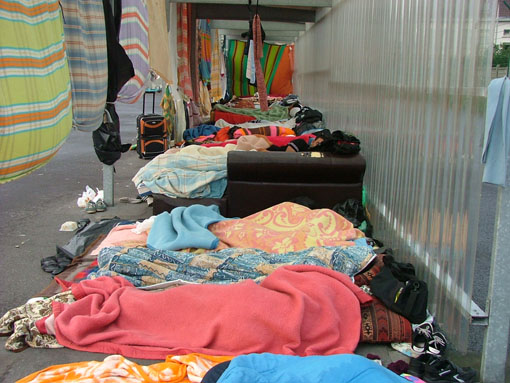
Living conditions: Salam
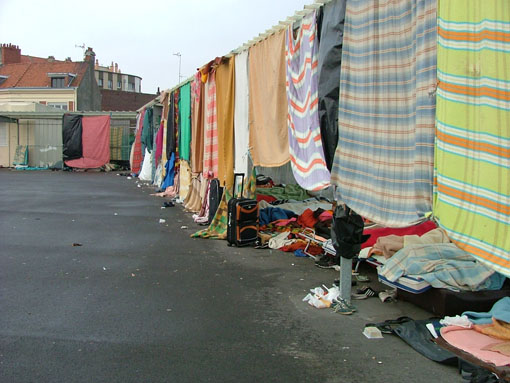
Salam
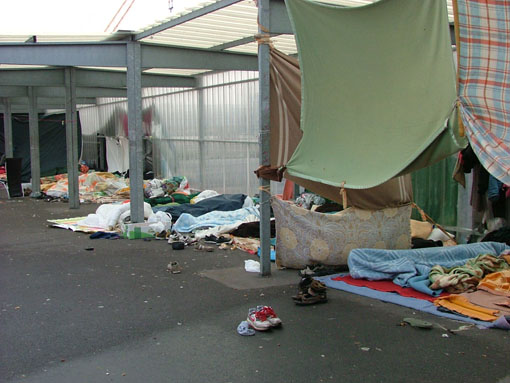
Salam
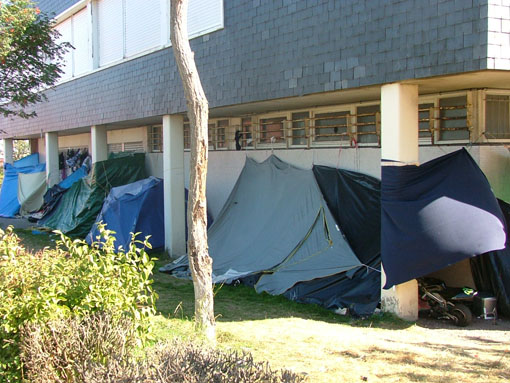
Customs building
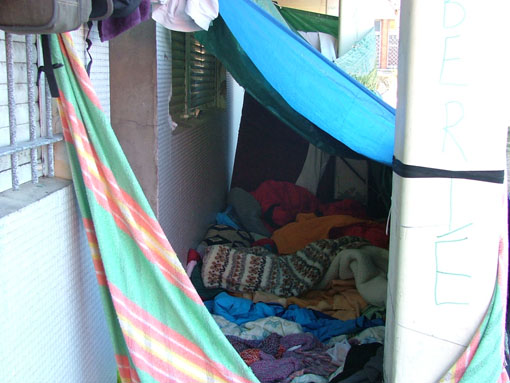
Customs building
In the meantime, all the other jungles and squats of Calais were evicted and destroyed, with a bit less publicity. One after the other, the Hazara jungle, the Kurdish jungle, the Iranian jungle, the Eritrean squat (the original ‘Africa House’), the Sudanese jungle and the camp by the docks all fell under the bulldozers.
The man who put is face on the destruction of the jungles was Eric Besson, then Immigration Minister in the Sarkozy government. He turned up at the destruction of the Pashto jungle to be photograped and give interviews. The reason he gave was that there was ‘no dignity’ in these camps and ‘no humanity’.
Three years later, over 200 migrants are still in Calais, surviving in terrible conditions. The number 200 is calculated on the spoons distributed at dinner, but we don’t know how many people are hiding and do not go to food distributions. Destructions and evictions of squats old and new have continued ever since. Nobody sleeps in the ‘jungles’ any more. The last big squat, housing some 40 men from Sudan, but also Somalia, Chad and other African countries, has just been evicted. Most people are left with no other choice than to sleep in the streets. Many sleep in the place of food distribution, popularly called ‘Salam’ after the name of the main charitable association that distribute the food; it is an awful place: there are no tables and and no chairs but there are tall fences – the barbed wire on top has been cut off by unknown persons, twice – there is not even a roof, besides two lines of corrugated plastic for the the people queueing for food, and up to 60 people sleep there now. Others sleep outside the building in front, belonging to the customs, or camp nearby as they can, all shelternig under sheets of tarpaulin. There are no toilets but 3 chemical toilets serving over 200 people, filthy beyond description as the Town Hall don’t even bother cleaning them except on very rare occasions. It has been the rainiest Summer in 100 years, in a part of the world where it rains a lot normally. The places where people sleep have been evicted many times by police, many people arrested in the raids, but they keep going back, having nowhere else to go. Most Calais migrants are refugees from the most war torn countries in the world. Main nationalities: Sudan (especially Darfur), Afghanistan, Iraqi Kurdistan, Eritrea, Ethiopia, Iran, Palestine, Syria, but also other Arab countries: Egypt, Tunisia, Morocco; there are also many Albanians. There are several unaccompanied minors, from all nationalities, but mainly Pashto boys from Afghanistan. The French State only takes responsibility for the minors if they apply for asylum in France, else they are left in the street. They are looked after by nobody but their own communities and are subjected to repeated, arbitrary arrests by police, exactely like the adults. Many commit self-harm as a result, in the form of cutting their arms or burning themselves with cigarettes. The youngest boy I have seen recently is only 11, on his own. Others are with a brother or other relative. One boy of 12, from Afghanistan’s border with Pakistan, had all his family killed except one little brother, but he does not know where he is. He did all the journey alone, and was in Patras for two months. In Calais he slept outside the customs’ building. In the little English he knows, he kept hyronizing on how all this situation is ‘fantastic!’ He tried every night, usuccesfully, to pass to England, then he went to the jungle of St Omer to try from there. A 13 years old arrived with his brother of 21. The older brother travelled to the UK when still a minor: after he turned 18 his asylum claim was rejected and he was deported back to Afghanistan. He is now making the same journey again, with his little brother! During his stay in Calais he was detained in Coquelles deportation centre and separated from his little brother, who did not know where he was; after a few days the older brother was released and now they are gone, hopefully they passed to England.
There are very seldom families, probably because living conditions in Calais are too harsh, but last time I was there there was a Kurdish family with two small chilren, a boy of 7 and a girl of 2 ½.
Fewer women arrive in Calais nowadays, partly due to the fact that the Eritrean and Ethiopians now tend to go to Norrent Fontes and Hazebrouk directly from Paris – the jungles there are a traditional point of passage for the Habesha people, and most women who pass from here are Habesha, escaping conscription in the Army. Last time I travelled to Norrent Fontes and Hazebrouk there was a record high number of women, some very young and some underage. Many of the women get raped during their journeys, and they arrive very traumatized and in need of protection – but there is nothing in place.
Most people present in Calais now have papers: either they have applied for asylum in France or they have refugee status in some other EU country. The asylum seekers should be given accommodation, by law, but there are not many bedspaces available, so they are left to wait for the result of their asylum application in the street, for up to 2 or 3 years. Many are refugees in Italy, where there are not facilities for the refugees, and to find work is very difficult, due to the worsening economic crisis. People who were in Italy for years, working, are also leaving. People who have no papers, or who have only temporary permits are often arrested, put in Coquelles deportation centre and sent either to their countries, or more often to other EU countries according to Dublin 2 regulations. People who have no papers have to hide, disappear like shadows, like hunted animals: there are police and paper controls everywhere, in the streets, in the places where people sleep (police go there morning and night to count them, like in prison), in the places where people gather, during food distributions there is always a police veihcle outside, they get constantly counted, photographed, identified, arrested. Calais is an awful place, a laboratory of repression. It is also a laboratory of resistence and community building, with the different migrant communities coming together. It is more than solidarity, it is brotherhood. Of course there are also fights and tensions but the spirit of community and mutual aid keeps growing. If we haven’t anything else we have each other. That's really something the government and the police cannot break.
When I go back to London, where I live, I appreciate how comfortable life is – life in Calais is so very hard, you can never rest, never sleep. But I miss the community, in a world fragmented and alienated where I don’t even know my next door neighbour. I miss the great sense of hospitality that the migrant communities have mantained: no matter how little they have, they have so much to offer, even though nowadays they can’t even boil water to make tea and I dearly miss it, not only I am fond of tea but I am so very fond of the way the Afghans, Sudanese, Habesha, Iranians, Arabs etc. offer it, I am so fond of their ancient courtesy, I am so fond of their manners. Coming from countries that have not suffered the industrial revolution they are less alienated than us, and the worlds they dwell in are beautiful and full of meaning. I spent so many happy hours sitting around fires, when they could still make fires, chatting, laughing, singing, listening to stories, between a police raid and the other. I never found so much dignity and humanity like amongst these homeless and dispossesed exiles.
Good news has it that the jungle of Norrent Fontes has now been furnished with little wooden houses, and so have the two surviving jungles in the Dunkerque area, at Téteghem and Grande Synthe. Modest as they are, these habitations are better than shacks or tents – and definitely far better than sleeping rough under a sheet of tarpaulin. Further, these wooden houses are the first semi-permanent structures that have been allowed, since the closure of Sangatte. In November it will be 10 years since the accomodation centre for migrants at Sangatte, run by the Red Cross, was shut down, in 2002, by the French government (Sarkozy was then the Immigration Minister) under pressure from the UK government. The British right wing press were saying Sangatte was a ‘magnet’ for ‘illegal immigrants’ trying to reach the UK. At the same time border controls were increasing, making it harder and harder to pass, and more dangerous, refugees and migrants were forced to go self-catering, in makeshift camps in the woods the migrants themselves called ‘jungles’, after a Persian word meaning ‘forest’, or in derelict buildings, usually with no water, no electricity, no toilets. The job to support and feed all these people was dumped mostly on the shoulders of unpaid volunteers. It was also made a crime to shelter undocumented migrants (délit de solidarité) and several local people were arrested and prosecuted for that. As there was ‘no humanity’ in these jungles and squats, and ‘no dignity’ in living in such conditions, accoriding to the Minister Besson, he decided to destroy them, leaving people to sleep rough. At the time Basson was boasting there were ‘no more migrants in Calais’, at least 400 were still there, and the place of food distribution had opened... only for meals at the time. There is a shelter for the cold weather, but it only opens when the temperatures drop to less than - 5 at night, or below freezing during the day, by order of the authorities. In other words, they would not let them die, but anything more than that is not allowed. The shelter is a disused gymn with no beds, only thin mattrasses on the ground – a progress anyway, they used to sleep on cardboards - no toilets, only some filthy chemical toilets outside, and not even a water tap people can use for drinking, brush their teeth, wash their face. It is only open at night and during the day people have to go out and freeze their arses.
There was a No Border camp in Calais in 2009, just before the destruction of the jungles. Some international activists who were at the camp decided to continue going there and help the migrants. They called themselves Calais Migrant Solidarity and they had a continue presence in Calais since the destruction of the jungle, 22nd Sept 2009. Since the closure of Sangatte, destructions of blankets, shelters and people’s property have been used as a mean to keep the number of people down, as well as repeated arbitrary arrests, and also beatings and CS gas. In other words, they heavily harass the people, many of whom are already traumatized by war, until they eventually leave. No Borders forced the police to be more civil, by exposing what they were doing. The main activity of Calais Migrant Solidarity is to monitor what the police are doing, taking pictures and film, which is perfectly legal. And very effective too: immediatley after the first short film on police violence went on YouTube, police violence dropped dramatically, at least in the form of beating migrants and spraying gas in their face. So I can safely say things would have been worst if the NoBorders had not been there. As a reward, many CMS activists have been assulted by police, then prosecuted on ridicolus charges of assaulting the police: all aquitted, so far. But we all pay the price, and we have a collection of broken cameras... broken by police! Other, less evident forms of violence continue unabated, such as keeping migrants (and sometime activists) in a cell for 12 hours, with no food and no water, or dropping migrants 10 miles out of Calais in the middle of the night, and make them walk all the way back. Now various associations combined are making complaints every time there is evidence of violence or ill treatement, and we are encouraging people to fill testimony forms. The destruction of blankets has pretty much ended, another small victory, since the associations complain and the NoBorders recuperate the blankets confiscated, and give them back to the migrants. The problem with the blankets now is another: as most people have to sleep rough the blankets get spoiled.
On top of that there are so many people coming and going, new people arrive every day with no blanket, no jacket, broken shoes . The small garage where the NoBorders keep blankets to distribute in emergency, that is every day now, is pretty empty: every day 2, 3, 5, 10, 15 new people arrive, one day more than 25... Even the volunteers, who do big distributions of clothes and blankets from a church hall every two weeks, are running short of everything. Neither them nor the NoBorders have funding. Winter is coming.
APPEAL:
Materials are very much needed, and money to buy them.
We besides lots of tarpaulin, we need blankets, sleeping bags, tents, camping mattrasses, men’s clothes such as jackets, trousers, jumpers- dark colours preferred, tracksuit bottoms, T-shirts medium/small, underwear, socks, hats, scarves, gloves, waterproofs, bags especially small rucksaks, men’s shoes are always in very much demand. Women’s and children’s clothes are not needed. Formal clothes are not needed, only sporty stuff.
For Calais Migrant Solidarity please contact
 calaisolidarity@gmail.com
calaisolidarity@gmail.com 0645465986
(0033 645465986 if calling from outside France)
Note that CMS do also other things, such as police monitoring.
Chiara
 Homepage:
calaismigrantsolidarity.wordpress.com/
Homepage:
calaismigrantsolidarity.wordpress.com/